PRINCETON, NJ -- Americans have the most confidence in their state governor and in business leaders to do the right thing for the economy. President Obama comes in third, followed by Republican and Democratic leaders in Congress. Federal Reserve Board Chairman Ben Bernanke ties with congressional Democrats and ranks slightly higher than Treasury Secretary Tim Geithner, Tea Party leaders, and labor union leaders.
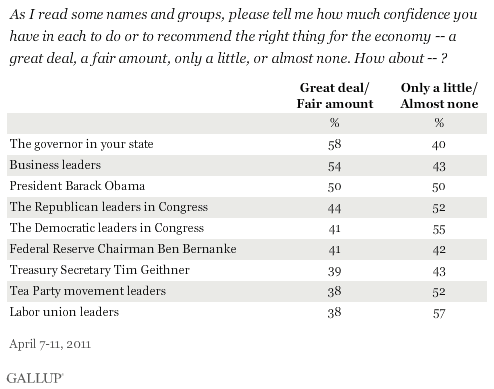
The findings are from a Gallup poll conducted April 7-11, amid federal budget negotiations in Washington. Gallup has asked this question each year since 2001 for the president, congressional leaders, and the Federal Reserve chairman.
Confidence in President Obama on Economy Down Sharply from 2009
Americans' confidence in President Obama's ability to do the right thing for the U.S. economy is down to 50% from 54% a year ago and 71% in 2009.
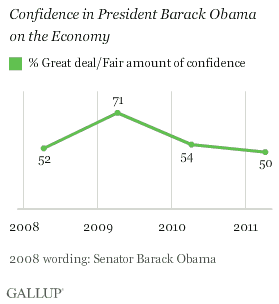
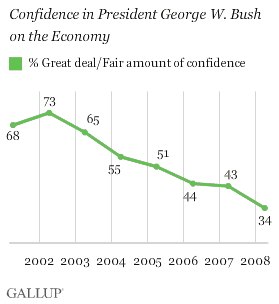
Although this is a steep drop in confidence for Obama, to date it is not as bad as that experienced by his predecessor. Americans' confidence that President George W. Bush would do the right thing for the economy fell from 73% in 2002 to 55% in 2004 and 34% by 2008.
Confidence in Congressional Democrats on Economy at Decade Low
Americans' confidence that Democratic leaders in Congress will do the right thing for the economy is at 41% -- marking its lowest level of the past decade and a decline from 43% in 2010 and 51% in 2009. Democrats fared best in 2001, when 66% of Americans expressed confidence in them regarding the economy; the previous low was 42% in 2005.
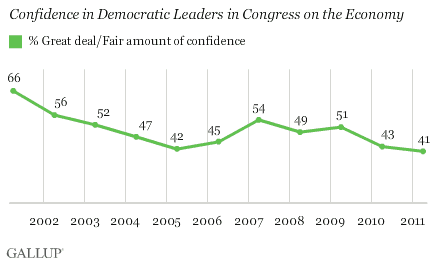
Confidence in Congressional Republicans on Economy About Same as for Democrats
Americans' confidence in congressional Republican leaders on the economy, now at 44%, is trending up since 2009, when it was 38%. Republicans fared best in 2001, when 66% of Americans expressed confidence in them regarding the economy -- identical to confidence in Democrats that year -- and the previous low was 37% in 2008.
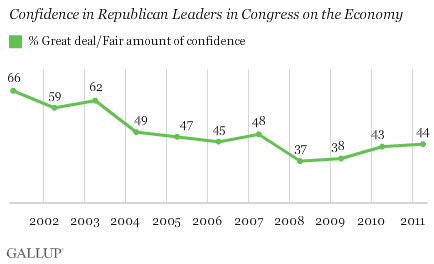
Implications
While Democratic and Republican congressional leaders debate how to reduce the federal budget deficit and its economic implications, Americans' confidence that they will do the right thing for the U.S. economy is relatively low. The sharp drop in confidence in the president and Democrats since 2009 combines with the modest increase in confidence in Republicans, leaving them all in the 40% to 50% confidence range.
Americans have relatively greater confidence in the governor of their state and in business leaders to do right by the economy. Many Americans may view positively the actions of many state governors to get their state budgets under control and enhance their competitiveness. They may also perceive state governors as doing more to address two of the nation's major challenges -- government spending and unemployment -- than lawmakers in the nation's capital.
Similarly, business leaders -- acting in their own self-interest -- are clearly trying to get the economy going and control the expansion of government regulation. These efforts may also be seen as addressing jobs and government spending.
Americans' relatively high trust in governors and business leaders on the economy suggests national policymakers may want to make more of an effort to listen to these leaders when considering efforts to help create new jobs and get the economy going. They seem to have ideas Americans like and ones that, if adopted, could help boost confidence in national leaders on the economy.
National political leaders may also want to be careful about discounting too quickly the ideas of labor and Tea Party leaders. Although these groups rank last in overall confidence concerning the economy, their ratings aren't much different from those Americans give their congressional leaders.
Survey Methods
Results for this Gallup poll are based on telephone interviews conducted April 7-11, 2011, with a random sample of 1,077 adults, aged 18 and older, living in all 50 U.S. states and the District of Columbia.
For results based on the total sample of national adults, one can say with 95% confidence that the maximum margin of sampling error is ±4 percentage points.
Interviews are conducted with respondents on landline telephones and cellular phones, with interviews conducted in Spanish for respondents who are primarily Spanish-speaking. Each sample includes a minimum quota of 400 cell phone respondents and 600 landline respondents per 1,000 national adults, with additional minimum quotas among landline respondents for gender within region. Landline telephone numbers are chosen at random among listed telephone numbers. Cell phones numbers are selected using random digit dial methods. Landline respondents are chosen at random within each household on the basis of which member had the most recent birthday.
Samples are weighted by gender, age, race, Hispanic ethnicity, education, region, adults in the household, and phone status (cell phone-only/landline only/both, cell phone mostly, and having an unlisted landline number). Demographic weighting targets are based on the March 2010 Current Population Survey figures for the aged 18 and older non-institutionalized population living in U.S. telephone households. All reported margins of sampling error include the computed design effects for weighting and sample design.
In addition to sampling error, question wording and practical difficulties in conducting surveys can introduce error or bias into the findings of public opinion polls.View methodology, full question results, and trend data.
For more details on Gallup's polling methodology, visit www.gallup.com.
